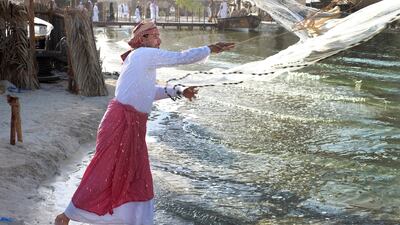The smell of gahwa is unmistakable. Coffee pots with long spouts like sea birds’ necks are sitting in a fire’s embers, the focus of a group of men relaxing on the soft sand. In front of them, a man and a woman, dressed in white and black, sit high on camels, accompanied by two men, singing and holding camel sticks. As scenes go, it’s less familiar than the men herding camels in camps near Al Wathba off the road to Al Ain, but the tableaux at the Qasr Al Hosn Festival have been staged to evoke impressions of the past.
There’s a smiling fisherman inviting children to haul in a traditional circular net (casting it is left to his expertise); men sit weaving fishing pots out of metal wire, others are mending fishing nets; but most impressive are the 60-somethings still able to shin up a palm tree barefoot to gather dates. Meanwhile, women in old Khaleeji dress keep shop in souqs, cluster together to weave baskets from khous and chat over their embroidery, as small boys kick a football outside.
The festival also has plenty of activities to spice up the scenic drama. Fancy a pony or camel ride? Both are hugely popular. Want to have a go at tying knots to rope together palm struts in an arish house? How about finding out more about the species of fish in the Gulf, or the migration routes of falcons? Want to have your photo taken in a gold Khaleeji burqa and shimmering shayla? Anything’s possible and there are plenty of Emiratis, expats and tourists enjoying the story being told about Abu Dhabi’s beginnings with a host of friendly ambassadors acting as narrators.
Sure, there’s a lot of artifice on display here. Dotting the site, posts loaded with speakers play lapping waves, calling seagulls, birdsong and a nearly howling wind in the desert, but the camels’ grumbles are real enough and the whiff of dung almost too authentic. “I remember these things from my grandmother’s house,” a woman browsing in a souq says to a couple of friends, all wearing abayas. Their iPhones underscore the age gap on either side of the shop counter. Before us there’s an impressive array of goods, from screw-top jars of Man hair cream to glass bottles of Otto de Rose Hair Oil, cooking oil and row upon row of jars of gahwa, ghee, chilli paste, curry spices and preserved fruit – all labelled with a mobile phone number, in case you’d like a refill. What’s on display at the souq has a global provenance: coffee cups, teapots, toy guns and kaffiyehs more likely made in China and India than here, but still in keeping with the way supplies were shipped along trading routes. Surveying the scene, I’m reminded of Guy Gravett’s black and white photographs of Abu Dhabi’s souq from 1962.
Just outside the main festival arena is the Qasr Al Hosn exhibition, new for this year’s festival. It tells the story of Abu Dhabi through the evolution of Qasr Al Hosn, from its early days as a watchtower guarding a watering hole, through 200 years as a fortress-cum-palace until its most recent role as the home of the National Archives.
What stands out most amid the old photographs, sketches, architectural drawings and diagrams is a black and white film of elderly Emiratis sharing their memories of early Abu Dhabi. They talk powerfully and movingly about a very different way of life in the 1950s, long before the settlement became a city and, as one puts it, started “growing every day”.
“These days were different,” Khadim Al Rumaithy says, smiling. “People used to love each other. A stranger would greet you as a friend would. People were frank with each other.” He is followed by Zalikha Al Sayed Al Hashimi, who remembers Friday visits to the majlis of Sheikh Shakhbut when Qasr Al Hosn’s guards would open its doors to local women. “We all used to go there to chat and drink coffee,” she says. “We would be offered in big baskets bread, flour, dates, coffee and cardamom. Each woman would take one home … Life was simple in the past.”
One speaker seems to vest particular importance in his recording. Dressed in a herringbone wool jacket and Omani turban, with kohl-rimmed eyes, Saeed Al Mansoori makes a striking historian: “This is where I grew up and what my eyes have seen and loved dearly,” he says, explaining how Sheikh Shakhbut used to leave the palace fortress to meet people, decades before a “sweet water” canal allowed Abu Dhabi to grow and grow fast.
Away from the hurly-burly around the fort outside, those old voices with their songs, stories and poems paint an equally vivid portrait of life before the glass towers that now ring the fort were even dreamt about.
Clare Dight is the editor of The Review.

